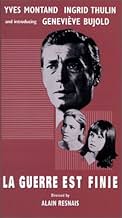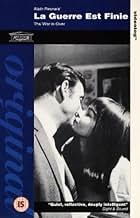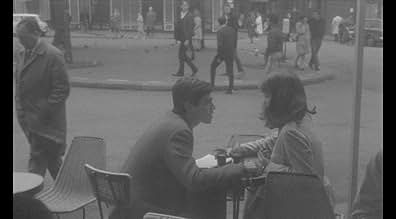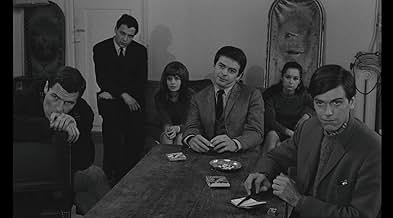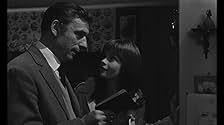IMDb-BEWERTUNG
7,2/10
2595
IHRE BEWERTUNG
Füge eine Handlung in deiner Sprache hinzuA veteran Republican fighter's ardent dedication to overthrow of Franco's regime is challenged. He realizes that the center of political struggle has shifted away from him, and is forced to ... Alles lesenA veteran Republican fighter's ardent dedication to overthrow of Franco's regime is challenged. He realizes that the center of political struggle has shifted away from him, and is forced to make choices about his life and political ideals.A veteran Republican fighter's ardent dedication to overthrow of Franco's regime is challenged. He realizes that the center of political struggle has shifted away from him, and is forced to make choices about his life and political ideals.
- Für 1 Oscar nominiert
- 4 Gewinne & 4 Nominierungen insgesamt
Empfohlene Bewertungen
Deleuze indicates that Resnais is one of the greatest political film-makers in the West, in modern cinema. According to him, this greatness comes from that they know how to show how people are what is missing, what is not there instead of presence of the people. Also, this film is related to a Spain that will not be seen: do the people in the old central committee stand with the young tereosits or the tired militant?
Many folks who watch this film today might be a bit confused about the context, so I'll try to explain. When the Spanish Republican army was defeated by Francisco Franco's troops at the end of the Spanish Civil War in the late 1930s, many Republicans (many of whom were communists and socialists) were jailed or killed--and many more poured over the border into exile in countries like France.
The character Yves Montand plays in this film, Diego Mora, is one of these communist exiles--one who regularly sneaks back and forth between the countries on missions for his cause. Exactly what he does on these missions is never talked about very much in these films but he and his comrades are trying to keep alive a small dissident group within Spain. However, during one of these many trips, he is taken in for questioning at the border. Somehow the police have become suspicious but with the help of a young French lady (Genevieve Bujold) he's able to extricate himself from custody. But, others in the organization weren't so lucky and were arrested. Because of this, Mora plans on returning to Spain to try to alert others in his cell so they can escape. However, instead of doing this, he spends so much of the film doing nothing in particular. In fact, that is a HUGE problem with the film. He learns about the possible leak in his organization and the arrests early on in the film and yet doesn't return to help the other agents until about 90 minutes later. In the interim, he meets with several women he cares about or wishes to have sex* with before his return to Spain. In addition, he talks and talks and talks--too much to keep the film interesting or well-paced. Overall, an interesting and well acted curio--especially since Montand himself was a communist and much of the story seems ironic in light of his own background as an Italian expatriate. But not a particularly enjoyable curio.
*Oddly, the first sex scene in the film was one of the most unintentionally funny I have ever seen. Instead of showing any real skin, the camera kept showing everything BUT--and with all sorts of artsy angles and composition. It made me laugh and seemed bizarre in light of the very ordinary and non-prudish sex scene later in the film. Why they did this, I have no idea. Perhaps the first nude scene (with Bujold) was done this way because she was uncomfortable with nudity and I'd sure love to know why they handled it in such a silly manner.
The character Yves Montand plays in this film, Diego Mora, is one of these communist exiles--one who regularly sneaks back and forth between the countries on missions for his cause. Exactly what he does on these missions is never talked about very much in these films but he and his comrades are trying to keep alive a small dissident group within Spain. However, during one of these many trips, he is taken in for questioning at the border. Somehow the police have become suspicious but with the help of a young French lady (Genevieve Bujold) he's able to extricate himself from custody. But, others in the organization weren't so lucky and were arrested. Because of this, Mora plans on returning to Spain to try to alert others in his cell so they can escape. However, instead of doing this, he spends so much of the film doing nothing in particular. In fact, that is a HUGE problem with the film. He learns about the possible leak in his organization and the arrests early on in the film and yet doesn't return to help the other agents until about 90 minutes later. In the interim, he meets with several women he cares about or wishes to have sex* with before his return to Spain. In addition, he talks and talks and talks--too much to keep the film interesting or well-paced. Overall, an interesting and well acted curio--especially since Montand himself was a communist and much of the story seems ironic in light of his own background as an Italian expatriate. But not a particularly enjoyable curio.
*Oddly, the first sex scene in the film was one of the most unintentionally funny I have ever seen. Instead of showing any real skin, the camera kept showing everything BUT--and with all sorts of artsy angles and composition. It made me laugh and seemed bizarre in light of the very ordinary and non-prudish sex scene later in the film. Why they did this, I have no idea. Perhaps the first nude scene (with Bujold) was done this way because she was uncomfortable with nudity and I'd sure love to know why they handled it in such a silly manner.
Yves Montand is a Spaniard in exile in Paris, a Communist working for the central committee in exile in Paris, trying to jump-start the Revolution. He's very professional about what he does. But the Spanish government has arrested agents and he realizes he's grown tired of the never-ending struggle, the insistence of the committee in Paris that their view from a distance gives them better insight than the people who are stationed in Spain. His lover, Ingrid Thulin wants his child, and he indulges in.a tired rant in front of her friends./coworkers tat everything moves and nothing changes.
Montand gives a fine performance as a man growing tired of the always hopeful attitude of the revolutionaries, their insistance on working out the details of life, anxious to snatch small bits of autonomy wherever he can He has grown tired of being a good soldier who sees no end to the war. Will he remain a good soldier? Can he? And what if he cannot?
Alain Resnais movie is far more straightforward than his other works, although he does make liberal use of flashbacks and interpolative stills. With Geneviève Bujold, Jean Dasté, and Michel Piccoli.
Montand gives a fine performance as a man growing tired of the always hopeful attitude of the revolutionaries, their insistance on working out the details of life, anxious to snatch small bits of autonomy wherever he can He has grown tired of being a good soldier who sees no end to the war. Will he remain a good soldier? Can he? And what if he cannot?
Alain Resnais movie is far more straightforward than his other works, although he does make liberal use of flashbacks and interpolative stills. With Geneviève Bujold, Jean Dasté, and Michel Piccoli.
"Patience and irony are the chief virtues of a Bolshevik."
Beautifully shot, with splashes of visual flair, like the fast edits or the scenes with the exquisite shimmering of light on the ceiling, an echo of the haze of looking back on a life of an underground struggle against fascism in Spain following the Civil War. The film highlights the need for perseverance, brotherhood, and sacrifice over the long haul to achieve regime change, as well as the melancholy that comes from perceiving that at some point one's own personal "war" may be over, but the movement will continue on in younger hands.
I loved the idea of it, but unfortunately, the story is about as dry as toast, and it takes far too long to get to the most interesting bit, which was the old guard revolutionary (Yves Montand) confronted with newer radicals who disagree with him on tactics. I wish that part had been more developed. There is just too much time spent on mundane aspects beforehand, the details for which were rather muddled, to sustain a two hour film. Even the presence of Geneviève Bujold and Ingrid Thulin couldn't save it from being a dull affair, and how Resnais shot the love scene between Bujold and Montand in such a (nearly comical) artsy way didn't help matters. As an exercise in filmmaking and with these stars, it holds some level of interest, but it's hard to see how anyone could get excited over it. Seeing it once was enough.
Beautifully shot, with splashes of visual flair, like the fast edits or the scenes with the exquisite shimmering of light on the ceiling, an echo of the haze of looking back on a life of an underground struggle against fascism in Spain following the Civil War. The film highlights the need for perseverance, brotherhood, and sacrifice over the long haul to achieve regime change, as well as the melancholy that comes from perceiving that at some point one's own personal "war" may be over, but the movement will continue on in younger hands.
I loved the idea of it, but unfortunately, the story is about as dry as toast, and it takes far too long to get to the most interesting bit, which was the old guard revolutionary (Yves Montand) confronted with newer radicals who disagree with him on tactics. I wish that part had been more developed. There is just too much time spent on mundane aspects beforehand, the details for which were rather muddled, to sustain a two hour film. Even the presence of Geneviève Bujold and Ingrid Thulin couldn't save it from being a dull affair, and how Resnais shot the love scene between Bujold and Montand in such a (nearly comical) artsy way didn't help matters. As an exercise in filmmaking and with these stars, it holds some level of interest, but it's hard to see how anyone could get excited over it. Seeing it once was enough.
This film has aged rather well considering that it's nearly 40 years old, that the concrete political situation(the Franco dictatorship in Spain)it was enmeshed in has disappeared, and that the musical score, the very mannered montage, and the sex scenes are all hopelessly dated and stilted. What gives this film its vitality is the screenplay written by Jorge Semprun, and it resonates today as well as it did in the mid-60s. Semprun had just written his classic, "The Long Voyage", in 1963, and the crisp trenchancy of his narrative style is just as evident in this film as it was in that story of his 1944 voyage to Buchenwald as a captured fighter of the French Resistance. Though we may not feel any longer the need to reassess the strategy of how to overthrow Franco, we still know what it's like to feel you're at the end of the rope with no place to leap to (both politically and psychologically). What Semprun reminds us, both in this film and in "The Long Voyage," is that it's the opportunities to experience solidarity with and support for others over the course of the journey that matters in the end.
Wusstest du schon
- WissenswertesScreenwriter Jorge Semprún's life and work as a member of the central committee of the Spanish Communist party from 1954 to 1965 are the basis of the character Diego Mora played by Yves Montand actions and thoughts in 'La Guerre est finie'.
- VerbindungenReferenced in What's My Line?: Yves Montand (2) (1967)
Top-Auswahl
Melde dich zum Bewerten an und greife auf die Watchlist für personalisierte Empfehlungen zu.
- How long is The War Is Over?Powered by Alexa
Details
- Erscheinungsdatum
- Herkunftsländer
- Sprachen
- Auch bekannt als
- The War Is Over
- Drehorte
- Boulevard Saint-Germain, Paris 6, Paris, Frankreich(tailing the young man at Metro Maubert)
- Produktionsfirmen
- Weitere beteiligte Unternehmen bei IMDbPro anzeigen
- Laufzeit
- 2 Std. 1 Min.(121 min)
- Farbe
- Sound-Mix
- Seitenverhältnis
- 1.66 : 1
Zu dieser Seite beitragen
Bearbeitung vorschlagen oder fehlenden Inhalt hinzufügen

